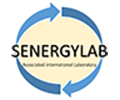You are here :
- Unité de recherche
- SenergyLab
- Home
- Sensorlab
Sensorlab
SensorLab research group is an electrochemistry research group that focuses on the fundamental and applied electrodynamics of smart materials for sensors, energy devices, and environmental and health solutions. Research activities at the SensorLab involves the designing, synthesis and analysis of organic and inorganic electroactive ‘smart’ nanomaterials for the construction of energy-generating, photovoltaic and chemo- and bio-sensor electrocatalytic systems. SensorLab is the most well-resourced electrochemistry research group in Africa and is home to an impressive array of AC and DC electrochemical workstations, spectroscopic, chromatographic and morphological analytical systems. Noteworthy areas of expertise include the application of AC voltammetry for frequency modulated signal deconvolution as well as the use of coupled electrochemistry techniques for materials evaluation and analysis such as situ UV/vis and FTIR spectro-electrochemistry. SensorLab places a strong emphasis of the development and training of skilled human capacity and has an established footprint for South African, inter-Africa and global research networks.
The UWC’s institutional strategy prioritises sensor research and its role in the development of integrated solutions to the problems of medical diagnostics, alternative energy and environmental management and sustainability in South Africa. In line with these objectives, the strategic objectives and directions of the joint research initiative will include the elaboration of advanced smart nanophase polymeric and metallo-composites and pure materials including low temperature transition metal oxide, nanoalloys, quantum dots, dendrimers, carbon nanotubes and graphenated systems. SensorLab will lead in the area of teaching and training in semiconductive nanomaterials for sensor system development.
Weblink to Sensorlab
The UWC’s institutional strategy prioritises sensor research and its role in the development of integrated solutions to the problems of medical diagnostics, alternative energy and environmental management and sustainability in South Africa. In line with these objectives, the strategic objectives and directions of the joint research initiative will include the elaboration of advanced smart nanophase polymeric and metallo-composites and pure materials including low temperature transition metal oxide, nanoalloys, quantum dots, dendrimers, carbon nanotubes and graphenated systems. SensorLab will lead in the area of teaching and training in semiconductive nanomaterials for sensor system development.
Weblink to Sensorlab


